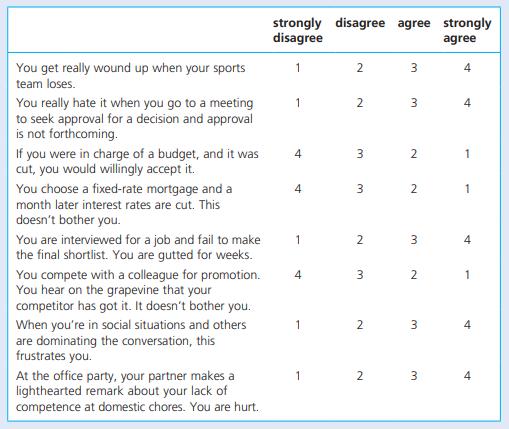It may be obvious that we all like to win and hate to lose, but it seems
Question:
It may be obvious that we all like to win and hate to lose, but it seems that some of us actually find winning stressful. To assess your own views, take the following test. Rate how you feel you would respond – strongly disagree to strongly agree – to each of these situations:

Oliver Schultheiss at the University of Michigan suggests that we are divided between wolves, who want to win, and sheep, who are distressed by beating others (Ahuja, 2006). The research first used a projective test, asking subjects to describe what they saw in photographs of people competing. The stories were scored for ‘implicit power motivation’ with high scorers designated wolves, and low scorers as sheep. They were then paired and asked to compete on a task requiring speed and accuracy, but the results were fixed in advance. Saliva samples were used to measure the level of a stress hormone. When the wolves lost, they became stressed. But when the sheep won, they became stressed. If you know the category to which you belong, you can adjust your work environment accordingly. Typical wolf occupations are: politician, teacher, stand-up comedian. Typical sheep occupations are: office worker, researcher, accountant. While some of us are competitive and find positions of power satisfying, others are less comfortable dominating others. Which are you? To calculate your score, just add the numbers in the boxes that you ticked:
Score 8–15: Sheep. You don’t hate winning, but when you lose, it doesn’t baa-ther you.
Score 16–24: Wolf in sheep’s clothing. Winning is more important in some aspects of life (work) than in others (relationships).
Score 25–32: Wolf. You have a howl-at-the-moon obsession with winning at everything.
1. Who are the sheep and who are the wolves in your group? Are the sheep happy about their scores, or do they want to be wolves instead? Are the wolves happy, or would they prefer to be sheep? Is it possible for people to change from one to the other?
2. Find out whether the wolves and sheep in your group have already chosen occupations and careers that are typical for people with those profiles. Do you think that sheep in wolves’ occupations will be less comfortable and less effective – and vice versa?
How useful are the results of this assessment to potential employers?
Step by Step Answer:

Organizational Behavior
ISBN: 978-0273774815
8th Edition
Authors: Andrzej A. Huczynski, David A. Buchanan





